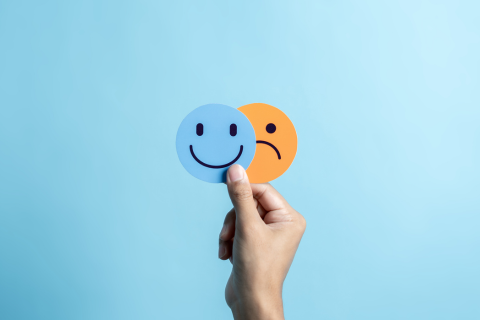Social media is saturated with saccharine sweet posts telling you to “look on the bright side”. Of course, it’s helpful to be reminded to appreciate the little things in life. It’s healthy to be reminded that there are also good things among the bad or to take a deep breath to help shift your perspective. And there are also true, scientifically-demonstrated benefits to a regular gratitude practice. The line between effective, healthy gratitude and toxic positivity is often blurry at best. So, what’s the difference?
Toxic positivity is typically characterized as focusing on the positive in a rigid and inflexible way while essentially dismissing a person’s emotional experience, whether it be your own or others’, instead of acknowledging and validating it. Gratitude, on the other hand, involves reflecting on even the smallest things you are grateful for and never requires that you negate your emotions. Toxic positivity eliminates the possibility that things are not good, while gratitude helps you find the good among the bad. Toxic positivity leaves no room for the sad, grumpy, angry moments —it reduces everything to only what is “happy”. Gratitude doesn’t reduce people’s experiences in this way; it leaves room for both the good and the bad while trying to “turn the volume up” on the good that we often overlook. You can have a terrible day and also spend two minutes reflecting on something you’re grateful for.

Here are some examples of toxic tropes common to social media.
“Everything happens for a reason.”
If it’s comforting for you to think about this for your own life, that’s great, more power to you! But not everyone believes this, so it may not be the most validating way to support a friend when they’re struggling. Plus, even if everything does happen for a reason, that doesn’t mean things are always positive, happy, or even painless.
“Things could be worse.”
Well, that could be true. But sometimes, things could also be better, and it does nobody any good to invalidate what they are feeling. It’s not going to make you stop feeling that thing! Telling someone things could be worse also suggests that the person is ungrateful or unappreciative for the good things they have when they’re already struggling, and that never helps.
“Cheer up!”
 I don’t know about you, but if I’m grumpy or upset, this is the last thing I want to hear. Most people can’t control their emotions to this extent, and even if you can, it’s generally not healthy to bottle up the painful things you feel. Emotions are data! You can learn from them, use them, and you should (to the extent you can) try to leave space for yourself to feel them.
I don’t know about you, but if I’m grumpy or upset, this is the last thing I want to hear. Most people can’t control their emotions to this extent, and even if you can, it’s generally not healthy to bottle up the painful things you feel. Emotions are data! You can learn from them, use them, and you should (to the extent you can) try to leave space for yourself to feel them.
“At least ____ didn’t happen…”
That’s true, but that doesn’t mean that the upsetting thing that did happen isn’t painful! Hypothesizing about how things could have been worse and using that to negate someone’s experience just doesn’t help!
“Positive vibes only.”

If only life were 100% positive! We are all human, and we all feel real human emotions. That makes things messy, but that mess is also unavoidable! Saying “positive vibes only” is like saying “clean dishes only”—I might wish it were possible, but it’s not. Everyone goes through stuff, and there are inevitable messes to live through.
Often, we are not even aware that we are responding to our own emotions and to the emotion of others with toxic positivity. We might have the best intentions and think we’re helping. What can we do to increase our awareness? Check out this recently published Psychology Today article to take a quick assessment and to learn more about how to cope! You might also benefit from reading about 4 Ways to Avoid Toxic Positivity and Why we should say no to positivity — and yes to our negative emotions. It can be hard to release ourselves from the toxically positive narratives that we tell ourselves, and it can also be incredibly challenging to respond to the toxically positive people in our lives. Coaching can help!
